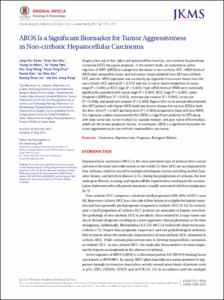AROS Is a Significant Biomarker for Tumor Aggressiveness in Non-cirrhotic Hepatocellular Carcinoma
- Keimyung Author(s)
- Ahn, Keun Soo; Kang, Koo Jeong
- Department
- Dept. of Surgery (외과학)
- Journal Title
- Journal of Korean Medical Science
- Issued Date
- 2015
- Volume
- 30
- Issue
- 9
- Keyword
- Carcinoma; Hepatocellular; Prognosis; Biological Markers
- Abstract
- Despite a low risk of liver failure and preserved liver function, non-cirrhotic hepatocellular
carcinoma (HCC) has a poor prognosis. In the current study, we evaluated an active
regulator of SIRT1 (AROS) as a prognostic biomarker in non-cirrhotic HCC. mRNA levels of
AROS were measured in tumor and non-tumor tissues obtained from 283 non-cirrhotic
HCC patients. AROS expression was exclusively up-regulated in recurrent tissues from the
non-cirrhotic HCC patients (P = 0.015) and also in tumor tissues irrespective of tumor
stage (P < 0.001) or BCLC stage (P < 0.001). High mRNA levels of AROS were statistically
significantly associated with tumor stage (P < 0.001), BCLC stage (P = 0.007), alpha
fetoprotein (AFP) level (P = 0.013), microvascular invasion (P = 0.001), tumor size
(P = 0.036), and portal vein invasion (P = 0.005). Kaplan-Meir curve analysis demonstrated
that HCC patients with higher AROS levels had shorter disease-free survival (DFS) in both
the short-term (P < 0.001) and long-term (P = 0.005) compared to those with low AROS.
Cox regression analysis demonstrated that AROS is a significant predictor for DFS along
with large tumor size, tumor multiplicity, vascular invasion, and poor tumor differentiation,
which are the known prognostic factors. In conclusion, AROS is a significant biomarker for
tumor aggressiveness in non-cirrhotic hepatocellular carcinoma.
- Publisher
- School of Medicine
- Citation
- Jung-Hee Kwon et al. (2015). AROS Is a Significant Biomarker for Tumor Aggressiveness in Non-cirrhotic Hepatocellular Carcinoma. Journal of Korean Medical Science, 30(9), 1253–1259. doi: 10.3346/jkms.2015.30.9.1253
- Type
- Article
- ISSN
- 1011-8934
- Appears in Collections:
- 1. School of Medicine (의과대학) > Dept. of Surgery (외과학)
- 파일 목록
-
-
Download
 oak-2015-0024.pdf
기타 데이터 / 622.69 kB / Adobe PDF
oak-2015-0024.pdf
기타 데이터 / 622.69 kB / Adobe PDF
-
Items in Repository are protected by copyright, with all rights reserved, unless otherwise indicated.